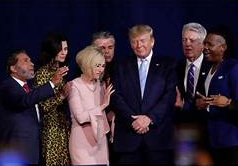America’s evangelical Christians grow up with the language of domination and submission. Of course, they want their president back.
Donald Trump, a figure of controversy and contradiction, embodies many aspects of American politics, but for a large portion of the Republican base, particularly evangelical Christians, his flaws are easily overlooked. He is a thrice-married adulterer, a businessman with a history of questionable practices, and even an alleged insurrectionist, but to many of his supporters, these are forgivable sins. A recent poll published on 4 January revealed that more Republicans consider Trump to be a man of faith than they do Joe Biden, Mitt Romney, or Mike Pence, all of whom have strong religious affiliations.
This phenomenon is not easily explained by conventional measures of morality or ethics. Trump’s appeal to evangelical Christians is rooted in a deeper understanding of power dynamics that many in this community find familiar. American evangelicalism often carries with it a framework of domination and submission, which plays a role in their acceptance of Trump’s personal failings. The language of power, submission, and redemption is deeply ingrained in the religious right’s worldview, making Trump’s imperfections easier to forgive.
In fact, many evangelical voters see Trump’s rough-edged persona as a form of authenticity that aligns with their belief in the ability to overcome personal flaws through redemption. Trump’s unapologetic approach to his mistakes and his willingness to challenge the political establishment resonate with a religious right that views societal systems as corrupt and in need of disruption. For them, Trump’s bombastic style and willingness to confront what they perceive as secular moral decay make him a figure they can rally behind, despite—or perhaps because of—his imperfections.
This dynamic speaks to a broader trend in American politics, where many voters prioritize what they view as a leader’s ability to challenge the system and represent their interests over traditional notions of personal virtue. In the case of evangelical Christians, Trump’s commitment to policies they support, such as opposition to abortion and support for religious freedom, outweighs any moral shortcomings they may see in him. The moral complexities of his personal life are seen as secondary to his ability to fight for their values.
Furthermore, Trump’s ability to engage with and speak directly to religious audiences has only strengthened his standing among evangelical voters. By invoking religious language, aligning himself with evangelical leaders, and pushing policies that resonate with conservative Christians, he has cultivated a loyal base that sees him as their champion, regardless of his past transgressions.
As a result, Trump’s support within the evangelical community remains steadfast, even as his critics point to his many moral failings. For the religious right, the appeal of Trump is not about his personal holiness, but about his power to enforce their vision of the country—one that aligns with their religious and cultural values.
In the eyes of many evangelical voters, Trump’s sins are not only forgivable—they are irrelevant when compared to the political and social power he represents. This helps explain why, despite his flaws, Trump remains a central figure in American politics and continues to garner support from religious conservatives, who are more focused on his ability to fight for their interests than on his personal shortcomings.

